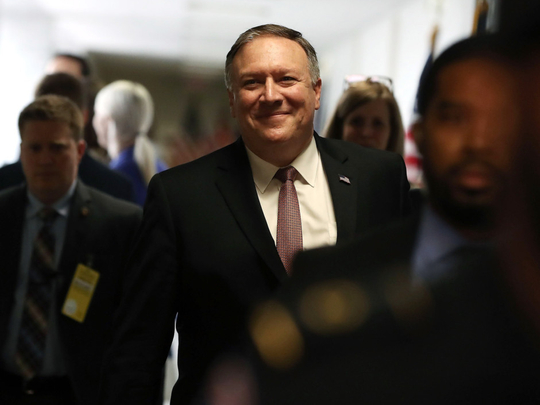
How convenient. A few days ago, news broke that CIA director Mike Pompeo had met two weeks ago North Korea’s dictator Kim Jong-un. This revelation came just as Senate Democrats’ opposition to Pompeo’s nomination to be secretary of state was mounting.
The argument now from the White House is that a vote not to confirm Pompeo would be a vote against a peaceful resolution of the nuclear standoff with Pyongyang. As White House Press Secretary Sarah Sanders subsequently tweeted: “Nothing could better underscore the importance of getting America’s top diplomat in place for such a time as this. Dems have an opportunity to put politics aside, acknowledge our national security is too important, and confirm Mike Pompeo. Statesmanship.”
The first political hurdle is the Senate Foreign Relations Committee. There is a good chance Pompeo’s nomination will not clear that panel, leading to an awkward vote on the Senate floor. One Republican on the committee, Rand Paul, has already said he would not vote for Pompeo. Meanwhile, last week, two key Democrats on the committee — Tim Kaine and Jeanne Shaheen — announced their opposition. Both voted for Pompeo last year when Trump nominated him to be CIA director.
Some Democrats now acknowledge that it’s a good thing to have a trusted aide to President Donald Trump lay the groundwork for such a high-stakes summit. Nonetheless, no Democrat has announced they will be supporting the nominee.
It’s hard to say whether the administration’s North Korea argument will sway any votes. Regardless, there’s a better reason for Democrats to vote for Pompeo: Not a potential deal with Pyongyang, but the deal that former president Barack Obama had negotiated with Tehran.
It’s counterintuitive. When Pompeo was a member of Congress, he was one of the sharpest critics of the Iran nuclear deal. Last summer, at the Aspen Security Dialogue, Pompeo made the case that Iran was not fully complying with the agreement’s terms. And for that, Pompeo has been blasted by those who helped push for Obama’s nuclear bargain back in 2015.
This is all the more reason senators should have been reassured week before last when Pompeo said his preference was to fix the nuclear deal instead of blowing it up. Indeed, he came out in favour of the US-European talks underway now to strengthen the nuclear deal by removing its sunset provisions, addressing Iran’s missile programme and strengthening inspection protocols for suspected military sites.
Trump will have to decide by May 12 whether to reimpose the crippling sanctions that Obama had imposed to pressure Iran to begin negotiations. That date has become a deadline for the US-European diplomacy that Pompeo would lead if confirmed as secretary of state.
Democratic Senator Robert Menendez week before last asked which Pompeo would lead the State Department? The one testifying before the Foreign Relations Committee or the one who so opposed the Iran deal when he was in Congress. (Menendez announced Wednesday that he was voting against the nominee.)
This, however, misses the point. The reason Menendez should want Pompeo to lead Foggy Bottom is that Trump already trusts him. This was not the case with the last secretary of state, Rex Tillerson. He was much closer to Senate Democrats on the Iran deal than he was to Trump. Tillerson was able to delay Trump’s decision to decertify Iran’s compliance with the deal. But along the way, he lost Trump’s trust. It’s unlikely Trump would have listened had Tillerson negotiated fixes with European allies.
Pompeo still has a chance. As a hawk who supported decertification inside Trump’s Cabinet, Pompeo has more credibility with Trump if a deal can be forged. Trump, after all, chose Pompeo to help prepare for the North Korea summit.
This also gives Pompeo more credibility with his European counterparts. Until now, the Europeans were rightly worried that any working-level discussions with the US on fixing the Iran deal would be for naught because Trump had already made up his mind. With Pompeo, they now have a credible interlocutor with the American president.
Finally, Pompeo himself knows the flaws of the Iran deal better than almost anyone in Washington. As a member of Congress, he met with European diplomats and bankers to inform them of the many risks that attended investment in Iran’s corrupt economy. If anyone can cajole the Europeans to strengthen the nuclear agreement, it’s a man who mastered the arcane details of US sanctions and Iran’s illicit money laundering.
And that is in everyone’s best interest. Even if Trump had never threatened to walk away from Obama’s nuclear deal, it always rested on a shaky proposition. The Iranians have consistently argued that the deal inoculates their economy from nearly all US sanctions, even as the regime unleashes its proxies to spread havoc throughout the Middle East. The Obama administration on the other hand insisted the US has the option to sanction Iran for its non-nuclear bad behaviour. Sooner or later, there would be a reckoning.
Now there is at least a chance to put the nuclear deal on stronger footing and address its deficits. The most important deficit remains the 10, 15 and 20-year sunsets on the limits for Iran’s low-enriched uranium stockpile and industrial enrichment facilities. Menendez is well aware of these flaws. When he voted against the deal in 2015, he said his “overarching concern” with the agreement was that “it requires no dismantling of Iran’s nuclear infrastructure and only mothballs that infrastructure for 10 years”.
Pompeo is committed to fixing that problem. If you supported Obama’s Iran deal, why not let him try?
— Bloomberg
Eli Lake was the senior national security correspondent for the Daily Beast and covered national security and intelligence for the Washington Times, the New York Sun and UPI.









